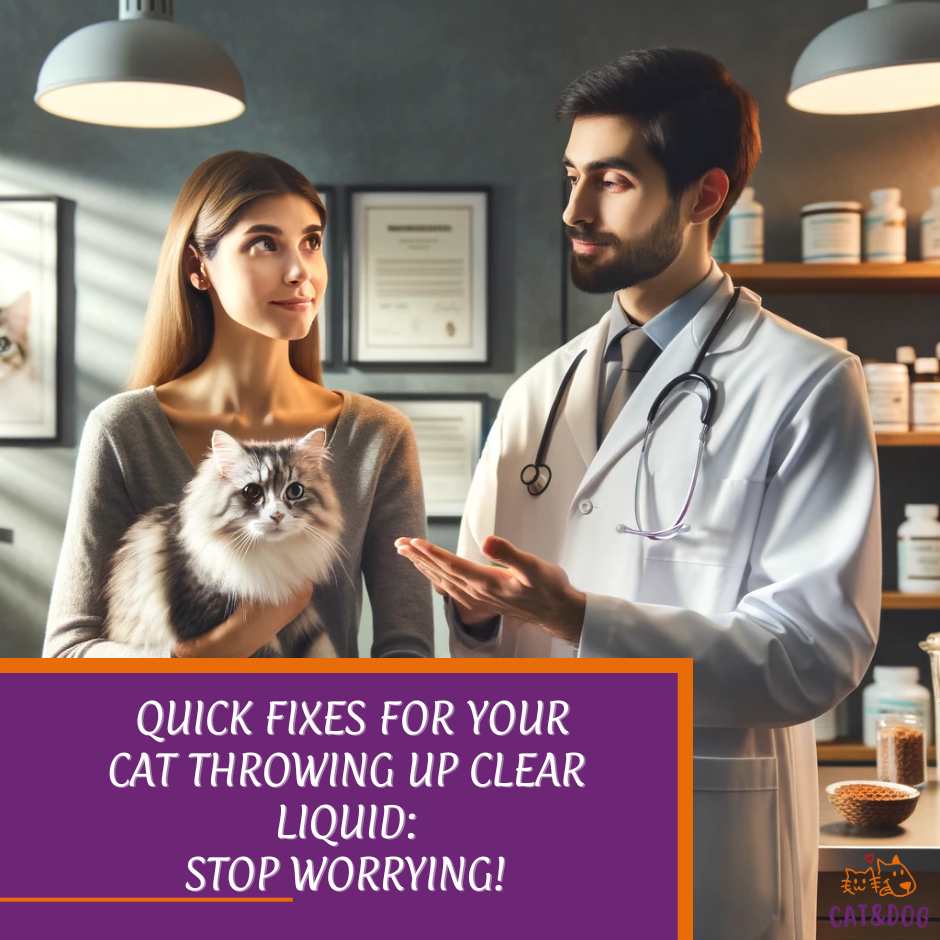You’re enjoying a peaceful evening at home when suddenly, you notice something’s not quite right with your beloved feline friend.
Those expressive, worried eyes lead you to discover the cause of concern—a puddle of clear fluid, unmistakably indicating that your cat throwing up clear liquid.
It’s a scenario that many cat owners find familiar and often alarming. Whether it’s an isolated incident or a recurring problem, understanding why your cat is throwing up clear liquid is crucial.
This symptom, often a blend of stomach fluids and mucus from the esophagus, can stem from a variety of causes. (1)
From minor dietary indiscretions to more serious health concerns, it’s essential to delve into the potential reasons behind your cat’s discomfort. (2)
By doing so, you can ensure your cat receives the appropriate care and attention, addressing any underlying health issues that may be affecting your cat’s well-being.
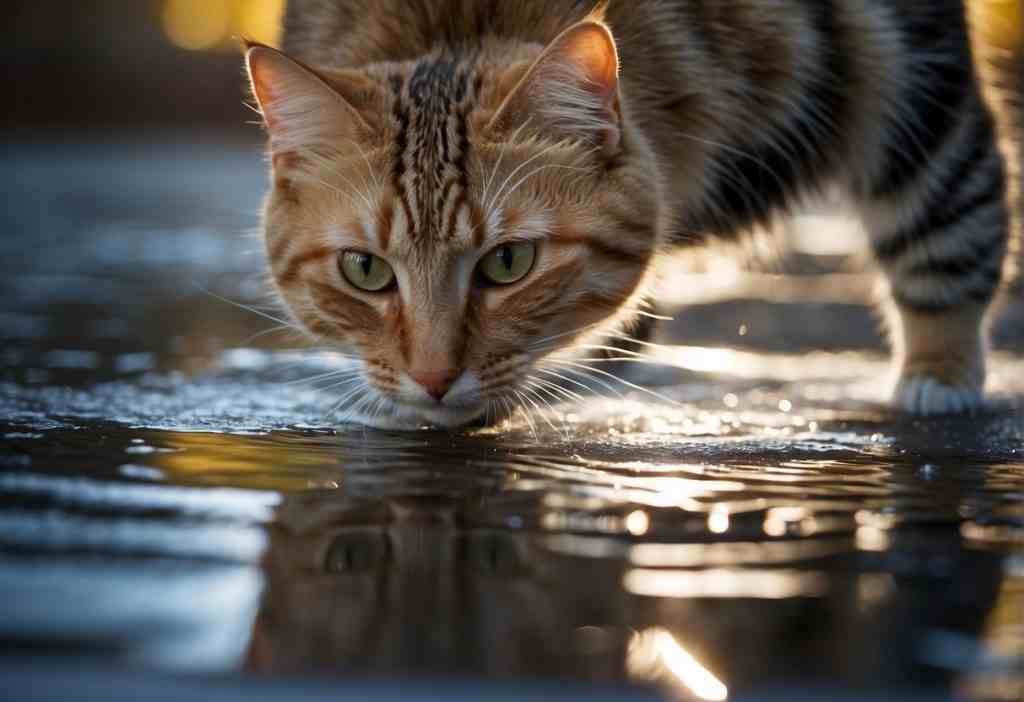
This article is your go-to guide on everything about a cat throwing up clear liquid.
We will discuss the potential causes, including hairballs or a minor tummy upset, as well as more serious health concerns such as kidney disease or diabetes that may require veterinary intervention for medical issues.
But it’s not just about understanding why—it’s also about knowing how to respond. From immediate care to long-term management strategies, we’ve got you covered.
And we know it’s stressful when your pet isn’t feeling well.
So here are some possible reasons why your cat may be throwing up clear liquid due to medical issues and what you should do about it, including when to contact a local urgent care vet or emergency vet for immediate assistance.
Key Takeaways
- Understanding why your cat is vomiting clear liquid is key to providing the right care.
- Immediate, appropriate responses can prevent further complications.
- Long-term management and support help ensure your cat’s well-being and prevent future incidents.
Understanding Cat Throwing Up Clear Liquid
Vomiting this type of liquid can point to something simple like stomach irritation from eating too quickly, or it might be a sign of something more serious such as dehydration or a systemic health issue involving the digestive tract, specifically the intestinal tract.
Intestinal sensitivities can also be a possible cause for your cat vomiting clear liquid, also known as an upset stomach.
Food puzzles can be a great source of enrichment for your feline friends while slowing them down and preventing them from experiencing an upset stomach caused by a buildup of stomach acid.
Understanding the potential causes of cat vomiting, including issues with the intestinal tract and upset stomach caused by food present, can help you better care for your furry companion.
When we talk about vomiting, it’s not to be mixed up with regurgitation. Vomiting is an active process, involving those tell-tale abdominal heaves.
Regurgitation, on the other hand, is usually passive – it’s like pressing the eject button on undigested chow.
Common Causes of Vomiting in Cats
Here are a couple of common reasons:
- Dietary Discrepancies:
Cats can be sensitive to changes in their food. Whether it’s a new brand or that sneaky snack they stole off your plate, their stomach might say a firm “nope.” - Famous Furballs:
Oh, the classic hairball—just when you think your cat is coughing breaking up with one, another might be forming.
Grooming leads to swallowed hair, which can accumulate and cause your cat to eject it in the only way they know how. - Underlying Health Conditions:
Sometimes, vomiting clear liquid is a red flag for conditions like kidney disease or diabetes. It’s less common but worth mentioning to your vet if the vomiting persists.
It’s not all gloom and whiskers, though! Many times, a bit of vomiting is just a bump in the road, especially if it is acute vomiting.
However, chronic vomiting can indicate a severe underlying health issue and only a vet can determine the root cause through a thorough examination at a veterinary clinic. (3)
This may include blood, fecal, and urine tests, as well as blood tests such as chemistry and CBC, to screen for serious conditions such as kidney disease, diabetes, and gastrointestinal lymphoma. (4)
But remember, your cat’s health is nothing to toss up in the air about.
If you see a pattern or have that gut feeling something’s not right, trust your instincts and consult your vet for a proper diagnosis and treatment plan, especially if gastrointestinal lymphoma is suspected.
After all, you know your purring pal better than anyone.
Immediate Care for Vomiting Cats
Let’s walk through the first steps to make sure your furry friend gets back on all four paws, feeling purr-fect.
Hydration is Key:
Water, water, and more water! Your cat’s little body needs to stay hydrated, especially after vomiting. Give them access to fresh water and monitor their intake.
- Withhold Food:
Hold off for about 12 hours for adults and 6 hours for kittens. This allows their stomach to settle. Fasting shouldn’t last more than 24 hours without veterinary advice.
Calm and Observe:
Pay close attention to their behavior. Are they back to playful pawing, or still acting under the weather? Jot down any ongoing symptoms—you’re the detective on the case!
When to Visit the Vet: Alright, you’re on the lookout. Keep an eye out for…
- Repeat vomiting
- Diarrhea
- Lethargy
- Signs of pain, such as meowing or howling
If these persist, it’s time for a vet visit!
Preventing Future Episodes:
A few tweaks to your cat’s lifestyle might make a world of difference. Try…
- Slow-feeder bowls to pace their eating frenzy
- A peaceful dining spot away from noisy areas
Alright, you now have your mission! Keep your cat hydrated, monitor their condition, and if things seem a bit off, a vet’s wisdom is just a call away.
Remember, you’re not alone in this – every cat guardian has been through it. Stay vigilant, and with these tips, you’ll have your purring pal back to their mischievous self in no time!
Don’t forget to also prioritize your cat’s health by seeking immediate care for your cat’s health from a veterinarian or pet parents if necessary.
It’s important to always stay on top of your cat’s health and address any concerns as soon as possible, especially when it comes to your cat’s health and well-being.
In addition, staying informed about your cat’s health and seeking advice from professionals can help ensure your cat’s well-being.
Long-Term Management Strategies
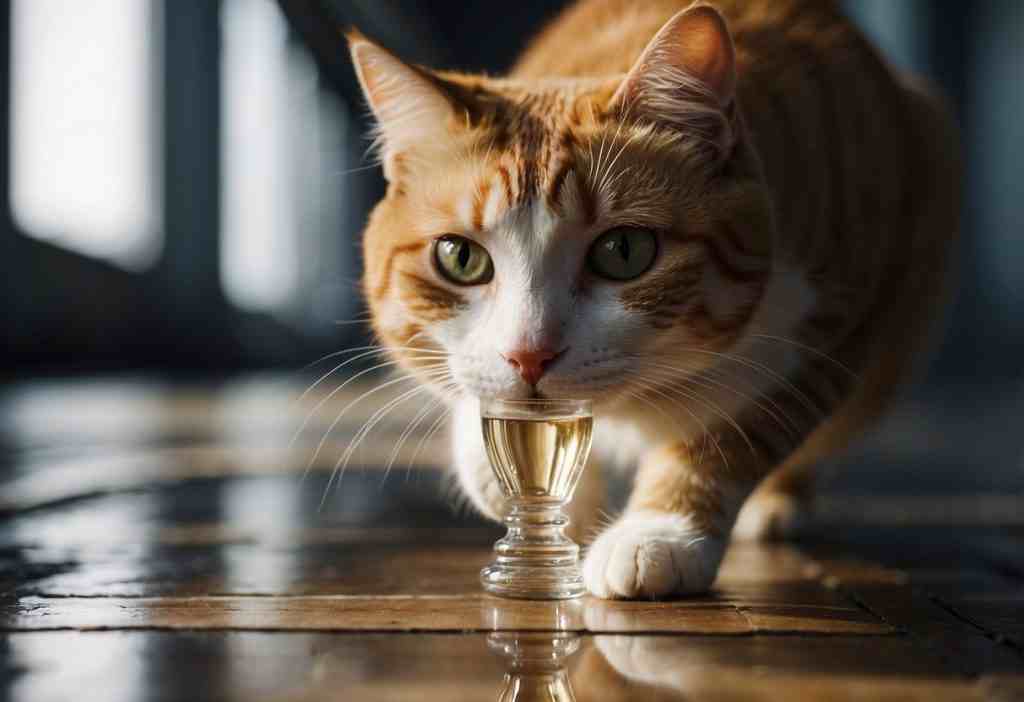
In-Depth Dietary Management
Identifying food allergies or sensitivities can be like playing detective with your cat’s health. Start with an elimination diet, a methodical way to find the culprit:
- Remove all the usual suspects from your cat’s diet.
- Introduce single-ingredient foods gradually.
- Monitor your cat’s reaction to each new food.
Pair this strategy with nutritional supplements or probiotics.
Research shows probiotics can bolster your kitty’s digestive health. Check with your vet for a tail-wagging, science-backed recommendation.
Lifestyle Adjustments for Cats Prone to Vomiting
Playtime isn’t just fun, it’s a health boost—exercise can help manage stress, a common vomiting trigger.
Break out those feather wands or laser pointers to get your cat pouncing!
A consistent feeding schedule keeps their gastrointestinal tract humming along without any hiccups. Try sticking to the same meal times daily to see a difference.
Remember, these tips are not just suggestions; they’re part of a caring plan to keep your whiskered pal healthy.
Keep a close eye on changes and consult your vet if you have any concerns. Playing it safe is always the cat’s meow!
Supporting Cat Owners
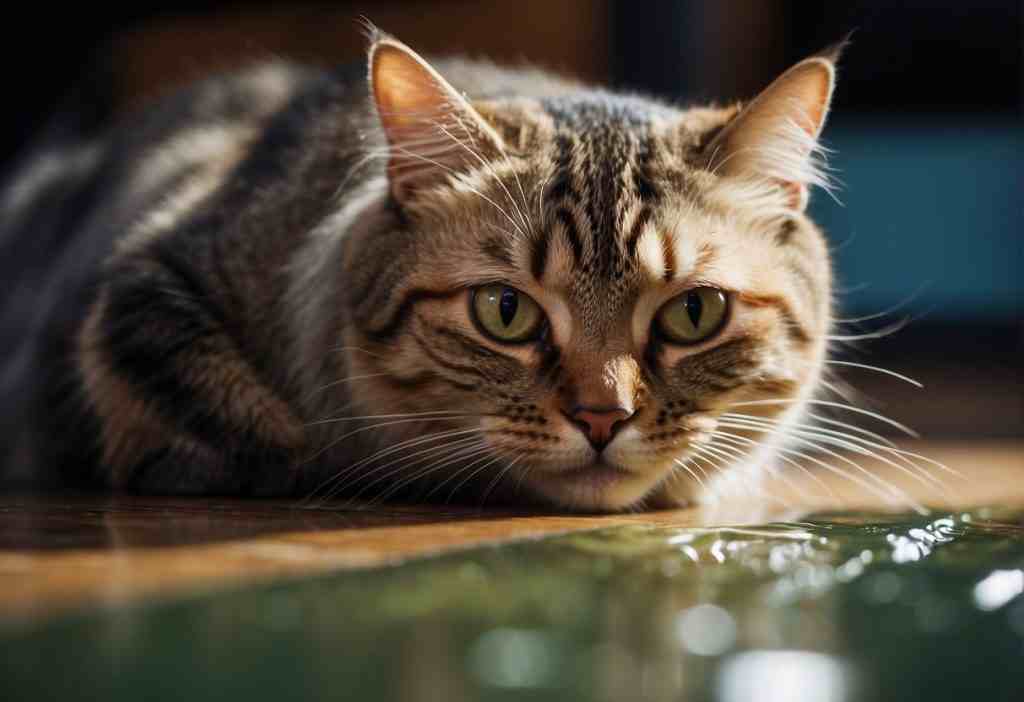
Vomiting a clear liquid can leave you puzzled and concerned, but you’re not alone in this. There’s a whole community of cat owners out there handling similar curveballs.
Emotional Support Resources
It’s normal. Check out these purr-fect places to find some solace and share your tails, I mean tales:
- Online Forums:
Websites like TheCatSite.com or Reddit’s r/cats offer vast networks of compassionate cat lovers who are probably typing out helpful responses as we speak. - Pet Grief Counseling:
Giving a call to services like the ASPCA Pet Loss Hotline can help if you’re feeling overwhelmed.
Vet Insights:
- Case 1: A cat with sudden, clear vomiting improved with a gradual diet change and stress reduction.
- Case 2: Another kitty needed a deworming treatment after a diagnosis of parasites was confirmed.
Don’t hang back—your experiences could be the guiding light for someone in the same cat-boat! And if things are looking complex, never underestimate the power of professional advice.
Your vet has probably seen it all!
Preventing Future Episodes
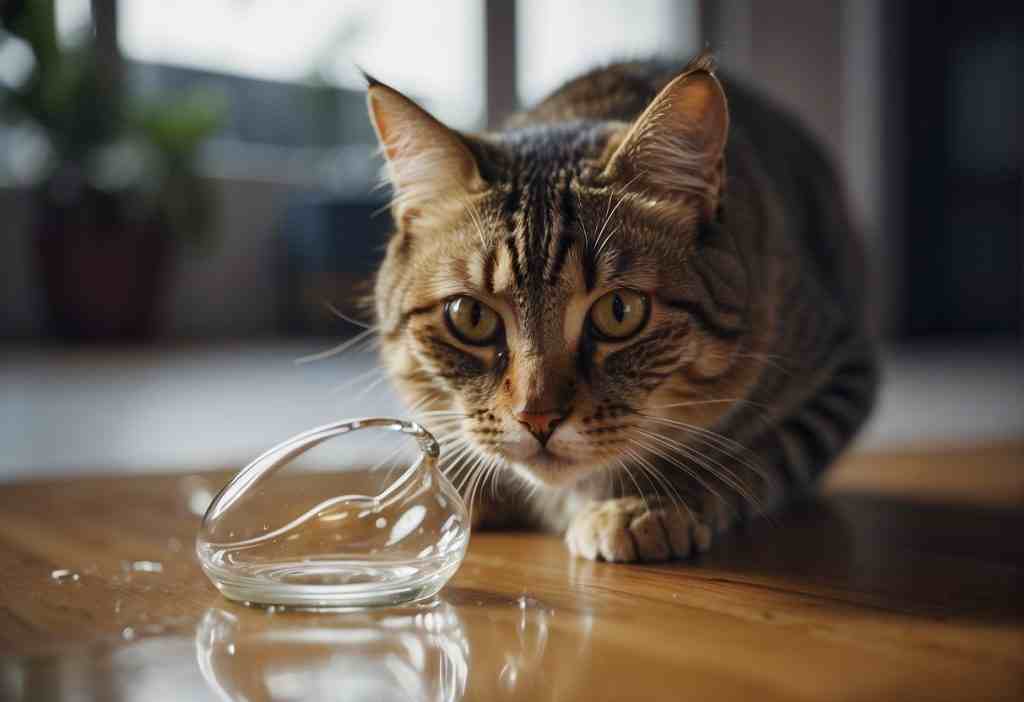
It can be worrisome, can’t it? Vomiting clear liquid can signal anything from a simple tummy upset to more complex health issues. Good news though!
You can take steps to help minimize the chances of this happening in the future, such as feeding low-fat meals, restricting meals for several hours, and considering fluid therapy as a treatment option.
First things first, regular vet check-ups are your new best friends! These visits are like detective work for catching health issues early on.
Vets can offer invaluable insight into your cat’s health and set up a plan to prevent vomiting episodes before they start.
Staying on top of routine immunizations and preventive care is like giving your cat a shield against certain illnesses. It’s as easy as marking your calendar or setting some reminders – whichever works for you! (5)
Here are some quick tips to keep your cat’s vomiting to a minimum:
- Well-balanced diet:
Like a fine-tuned engine, your cat’s stomach thrives on the right fuel. Introduce dietary changes slowly to avoid upsetting their system. - Hairball prevention:
Regular grooming can reduce hair ingestion. No more hacking up furballs! - Hydration is key:
A well-hydrated cat is a happy cat. Freshwater, daily, keeps upset tummies at bay.
By incorporating these steps, including regular visits to the vet, you’re not just helping prevent bouts of vomiting, but you’re also investing in your cat’s overall well-being.
Because really, is there anything better than a happy, healthy ball of fur purring on your lap? Keep it simple, keep it routine, and you’ll both be just fine!
Additionally, using food puzzles can also help prevent vomiting in cats by slowing down their eating and stimulating their natural instincts.
Regular brushing with a cat brush designed to remove loose fur can also help prevent vomiting by removing any loose hair and fur that could otherwise be consumed in their cat’s food.
It is important to note that when changing your cat’s food, it is recommended to do it gradually over a one to two-week period, gradually decreasing the amount of current cat food while increasing the amount of new cat’s food.
This will help prevent any dietary changes that could lead to vomiting.
Frequently Asked Questions
Cats vomiting clear liquid can be a cause for concern, but knowing what to look for can help you respond appropriately. Let’s tackle some common questions you might have about this feline issue.
What does it mean when a cat vomits clear liquid?
Vomiting clear liquid often indicates that your cat’s stomach is empty except for gastric juices, water, or saliva.
This may happen due to illness, dietary indiscretion, or hairballs.
How can I prevent my cat from vomiting clear liquid?
To prevent your feline friend from vomiting clear liquid, ensure they have a balanced diet, and regular grooming to minimize hairballs and keep stress to a minimum.
Should I withhold food from my cat if they vomit clear liquid?
Withholding food for a short period can give your cat’s stomach time to settle.
However, don’t do this for more than 24 hours, and reintroduce small, bland meals.
When should I take my cat to the vet for vomiting?
If your cat is vomiting frequently, appears lethargic, is in pain, or has other symptoms like diarrhea, it’s time for a vet visit.
It’s better to play it safe when it comes to your pet’s health.
Can hairballs cause my cat to vomit clear liquid?
Yes, hairballs can lead to vomiting clear liquid, especially if your cat’s trying to expel a hairball but only gastric fluid comes up.
Are certain breeds more prone to vomiting clear liquid?
Some cat breeds with longer coats, like Persians or Maine Coons, might be more prone to hairball-related vomiting.
Regular grooming can help reduce this risk.
How do I change my cat’s diet if I suspect food sensitivities?
If you think your cat’s food may be causing stomach upsets, transition them to a new diet gradually over several days.
Introduce the new food in small amounts, increasing it slowly to avoid further digestive issues.

